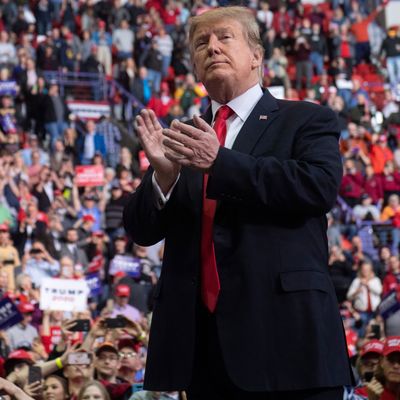
It’s never that surprising when a narcissist thinks he’s sitting on top of the world. Still, this Associated Press report from Team Trump that overconfidence could be its big problem heading toward the 2020 reelection campaign is an indication that the disease is spreading:
Trump and his allies are exuding optimism about his 2020 bid, touting a strengthening economy, their organizational and fundraising head-start and a crowded Democratic primary poised to turn ugly. With the Mueller report completed and no GOP primary challenger gaining traction against Trump, many Republicans believe — and have started to act like — the president is the odds-on favorite to win a second term.
Having recently conducted my own horizon-to-horizon assessment of Trump’s current reelection prospects, and concluded he’s a slight underdog, I find the arguments that he should be a heavy favorite interesting but not terribly compelling. Let’s look at the ones AP cites:
1. History. “When unencumbered by primary challengers, sitting presidents have never lost their reelection bids in the modern era, bringing to bear structural advantages, not the least of which is that they don’t have to persuade voters to imagine them in that role.”
This is a classic double-loaded statistic, which assumes that presidents are made weak by primary opponents rather than weak presidents attracting primary opposition. Trump is unusual in that he’s very strong within his party’s base — the electorate that would sustain a primary challenge — but has very short reach beyond it. So he’s precisely the kind of president who’s more vulnerable in a general election than in a primary.
The idea that Trump is helped by the fact that voters now don’t have to imagine him as president assumes that the reality is less disturbing than the original fears about this unlikely president. His perpetually underwater job-approval ratings, and the intensity of hostility he generates among those who don’t buy his act, suggest otherwise.
2. The economy. Yes, the economy is doing well. No, historically that doesn’t matter unless the economy is doing well in the election year itself. And even in “good” economic times, there are politically important shadows in the sunshine involving the distribution of wealth, regional inequities, and troublesome areas like health-care costs. So while the economy may help Trump, if it slows down, all bets are off, and the large percentage of voters who clearly don’t care for him will be reluctant to give him credit for positive trends and quick to blame him for negative trends.
3. Popularity. According to AP: “Recent surveys have shown Trump’s approval ratings improved from 2018 lows and near the historical threshold consistent with reelection.”
Near but, quite possibly, oh so far. Trump’s approval ratings are amazingly inflexible, and while he’s had a mild rise in recent weeks, he has yet to hit 45 percent in average approval ratings at either RealClearPolitics or FiveThirtyEight since the earliest days of his presidency. If and when that happens, we can talk about him finally achieving levels of popularity that reelected presidents invariably possess.
Team Trump also seems to reject the idea that the 2018 midterms are in any way indicative of his relative popularity:
[T]hough the midterm elections were tough on the GOP, Trump’s team believes Republicans struggled because the president’s name wasn’t on the ballot.
In fact, midterm elections are often even more of a referendum on presidents than reelection contests, which are to a considerable extent comparative. Indeed, Trump certainly acted like it was a referendum, campaigning heavily and taking credit for any and all GOP success stories.
It’s true that presidents can lose midterms and win reelections — Clinton and Obama being recent examples — but that’s because they regained popularity, not because they never lost it. Trump has yet to show he can do that himself.
4. Democrats in Disarray. Trump and his acolytes appear sure that the big field of presidential candidates will divide the Donkey Party and make the ultimate nominee easy pickings for a Red Scare campaign by Republicans that drives down the opponent’s popularity to sub-Trump levels.
The best response to that argument is: Look what happened in 2016. Republicans had nearly as large a field then as Democrats do now. Intra-party conflict, much of it aimed at Trump, reached levels of virulence that 2020 Democrats with their electability fears are very unlikely to match. And it took the divided GOP a long, long time to come together on behalf of its nominee, even as Hillary Clinton’s campaign pounded Trump day in and day out as a deeply flawed character with extreme views. Is there any realistic possibility that Trump’s 2020 opponent will have to overcome as much adversity as he did? I don’t think so.
Trump is currently an unpopular president who has deliberately chosen not to expand his appeal and is counting on an awful lot of luck in order to be reelected. He may have already overdrawn his reservoir of luck in 2016. But in any event, he has no reason to walk tall right now. Any degree of confidence he expresses could well be overconfidence.






























